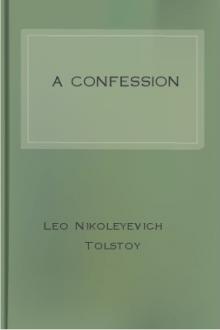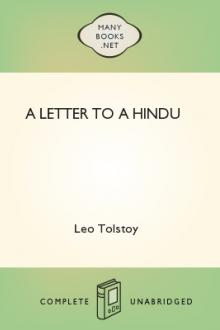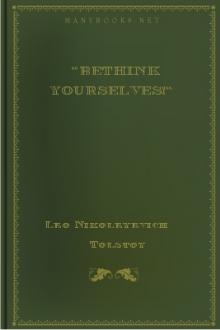A Confession by Leo Nikoleyevich Tolstoy (best sales books of all time txt) 📕

- Author: Leo Nikoleyevich Tolstoy
- Performer: -
Book online «A Confession by Leo Nikoleyevich Tolstoy (best sales books of all time txt) 📕». Author Leo Nikoleyevich Tolstoy
A Confession
by Lev Nikolayevich Tolstoy
II was baptized and brought up in the Orthodox Christian faith. I was taught
it in childhood and throughout my boyhood and youth. But when I abandoned
the second course of the university at the age of eighteen I no longer
believed any of the things I had been taught.
Judging by certain memories, I never seriously believed them, but had merely
relied on what I was taught and on what was professed by the grown-up people
around me, and that reliance was very unstable.
I remember that before I was eleven a grammar school pupil, Vladimir
Milyutin (long since dead), visited us one Sunday and announced as the
latest novelty a discovery made at his school. This discovery was that there
is no God and that all we are taught about Him is a mere invention (this was
in 1838). I remember how interested my elder brothers were in this
information. They called me to their council and we all, I remember, became
very animated, and accepted it as something very interesting and quite
possible.
I remember also that when my elder brother, Dmitriy, who was then at the
university, suddenly, in the passionate way natural to him, devoted himself
to religion and began to attend all the Church services, to fast and to lead
a pure and moral life, we all — even our elders — unceasingly held him up to
ridicule and for some unknown reason called him “Noah”. I remember that
Musin-Pushkin, the then Curator of Kazan University, when inviting us to
dance at his home, ironically persuaded my brother (who was declining the
invitation) by the argument that even David danced before the Ark. I
sympathized with these jokes made by my elders, and drew from them the
conclusion that though it is necessary to learn the catechism and go to
church, one must not take such things too seriously. I remember also that I
read Voltaire when I was very young, and that his raillery, far from
shocking me, amused me very much.
My lapse from faith occurred as is usual among people on our level of
education. In most cases, I think, it happens thus: a man lives like
everybody else, on the basis of principles not merely having nothing in
common with religious doctrine, but generally opposed to it; religious
doctrine does not play a part in life, in intercourse with others it is
never encountered, and in a man’s own life he never has to reckon with it.
Religious doctrine is professed far away from life and independently of it.
If it is encountered, it is only as an external phenomenon disconnected from
life.
Then as now, it was and is quite impossible to judge by a man’s life and
conduct whether he is a believer or not. If there be a difference between a
man who publicly professes orthodoxy and one who denies it, the difference
is not in favor of the former. Then as now, the public profession and
confession of orthodoxy was chiefly met with among people who were dull and
cruel and who considered themselves very important. Ability, honesty,
reliability, good-nature and moral conduct, were often met with among
unbelievers.
The schools teach the catechism and send the pupils to church, and
government officials must produce certificates of having received communion.
But a man of our circle who has finished his education and is not in the
government service may even now (and formerly it was still easier for him to
do so) live for ten or twenty years without once remembering that he is
living among Christians and is himself reckoned a member of the orthodox
Christian Church.
So that, now as formerly, religious doctrine, accepted on trust and
supported by external pressure, thaws away gradually under the influence of
knowledge and experience of life which conflict with it, and a man very
often lives on, imagining that he still holds intact the religious doctrine
imparted to him in childhood whereas in fact not a trace of it remains.
S., a clever and truthful man, once told me the story of how he ceased to
believe. On a hunting expedition, when he was already twenty-six, he once,
at the place where they put up for the night, knelt down in the evening to
pray — a habit retained from childhood. His elder brother, who was at the
hunt with him, was lying on some hay and watching him. When S. had finished
and was settling down for the night, his brother said to him: “So you still
do that?”
They said nothing more to one another. But from that day S. ceased to say
his prayers or go to church. And now he has not prayed, received communion,
or gone to church, for thirty years. And this not because he knows his
brother’s convictions and has joined him in them, nor because he has decided
anything in his own soul, but simply because the word spoken by his brother
was like the push of a finger on a wall that was ready to fall by its own
weight. The word only showed that where he thought there was faith, in
reality there had long been an empty space, and that therefore the utterance
of words and the making of signs of the cross and genuflections while
praying were quite senseless actions. Becoming conscious of their
senselessness he could not continue them.
So it has been and is, I think, with the great majority of people. I am
speaking of people of our educational level who are sincere with themselves,
and not of those who make the profession of faith a means of attaining
worldly aims. (Such people are the most fundamental infidels, for if faith
is for them a means of attaining any worldly aims, then certainly it is not
faith.) these people of our education are so placed that the light of
knowledge and life has caused an artificial erection to melt away, and they
have either already noticed this and swept its place clear, or they have not
yet noticed it.
The religious doctrine taught me from childhood disappeared in me as in
others, but with this difference, that as from the age of fifteen I began to
read philosophical works, my rejection of the doctrine became a conscious
one at a very early age. From the time I was sixteen I ceased to say my
prayers and ceased to go to church or to fast of my own volition. I did not
believe what had been taught me in childhood but I believed in something.
What it was I believed in I could not at all have said. I believed in a God,
or rather I did not deny God — but I could not have said what sort of God.
Neither did I deny Christ and his teaching, but what his teaching consisted
in I again could not have said.
Looking back on that time, I now see clearly that my faith — my only real
faith — that which apart from my animal instincts gave impulse to my life
— was a belief in perfecting myself. But in what this perfecting consisted
and what its object was, I could not have said. I tried to perfect myself
mentally — I studied everything I could, anything life threw in my way; I
tried to perfect my will, I drew up rules I tried to follow; I perfected
myself physically, cultivating my strength and agility by all sorts of
exercises, and accustoming myself to endurance and patience by all kinds of
privations. And all this I considered to be the pursuit of perfection. the
beginning of it all was of course moral perfection, but that was soon
replaced by perfection in general: by the desire to be better not in my own
eyes or those of God but in the eyes of other people. And very soon this
effort again changed into a desire to be stronger than others: to be more
famous, more important and richer than others.
IISome day I will narrate the touching and instructive history of my life
during those ten years of my youth. I think very many people have had a like
experience. With all my soul I wished to be good, but I was young,
passionate and alone, completely alone when I sought goodness. Every time I
tried to express my most sincere desire, which was to be morally good, I met
with contempt and ridicule, but as soon as I yielded to low passions I was
praised and encouraged.
Ambition, love of power, covetousness, lasciviousness, pride, anger, and
revenge — were all respected.
Yielding to those passions I became like the grown-up folk and felt that
they approved of me. The kind aunt with whom I lived, herself the purest of
beings, always told me that there was nothing she so desired for me as that
I should have relations with a married woman: ‘Rien ne forme un juene homme,
comme une liaison avec une femme comme il faut’. [1] Another happiness she
desired for me was that I should become an aide-de-camp, and if possible
aide-de-camp to the Emperor. But the greatest happiness of all would be that
I should marry a very rich girl and so become possessed of as many serfs as
possible.
I cannot think of those years without horror, loathing and heartache. I
killed men in war and challenged men to duels in order to kill them. I lost
at cards, consumed the labor of the peasants, sentenced them to punishments,
lived loosely, and deceived people. Lying, robbery, adultery of all kinds,
drunkenness, violence, murder — there was no crime I did not commit, and in
spite of that people praised my conduct and my contemporaries considered and
consider me to be a comparatively moral man.
So I lived for ten years.
During that time I began to write from vanity, covetousness, and pride. In
my writings I did the same as in my life. to get fame and money, for the
sake of which I wrote, it was necessary to hide the good and to display the
evil. and I did so. How often in my writings I contrived to hide under the
guise of indifference, or even of banter, those strivings of mine towards
goodness which gave meaning to my life! And I succeeded in this and was
praised.
At twenty-six years of age [2] I returned to Petersburg after the war, and
met the writers. They received me as one of themselves and flattered me. And
before I had time to look round I had adopted the views on life of the set
of authors I had come among, and these views completely obliterated all my
former strivings to improve — they furnished a theory which justified the
dissoluteness of my life.
The view of life of these people, my comrades in authorship, consisted in
this: that life in general goes on developing, and in this development we
— men of thought — have the chief part; and among men of thought it is we
— artists and poets — who have the greatest influence. Our vocation is to
teach mankind. And lest the simple question should suggest itself: What do I
know, and what can I teach? it was explained in this theory





Comments (0)